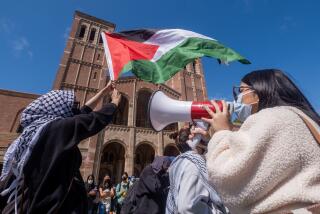Israel’s Election Leaves Its Arabs Cold
- Share via
JAFFA, Israel — JAFFA, Israel -- If the topic of elections should arise in the Arab-owned shops along this ramshackle block, somebody’s likely to utter the expression: If it’s a black dog or a white dog, what’s the difference?
“It’s still a dog,” said a 57-year-old taxi driver named Charlie, staring through a sweet-shop window to the rainy street beyond. “Why vote between the two?”
In other words, left wing or right, coalition or none, Israel is still a Jewish state, and many of its one million Arabs feel like outsiders in the only nation they know. Shadowed by ennui and sporadic calls from some political leaders to boycott Tuesday’s elections, about 40% of Arab voters shunned the polling stations.
As a result, the Arab parties lost a parliamentary seat, shrinking their legislative clout to nine out of 120 members of the Knesset. The first Arab woman to sit in Israel’s parliament also was ousted in an election that pulled a war-hardened Israel further to the right.
The apathy of Arab voters was emblematic of an election that drew the lowest voter turnout in the history of Israel -- and underlined the deepening divisions in a nation plagued by relentless violence and distrust.
Charlie said Wednesday that he cast a reluctant vote for the left-wing Meretz Party, which fields both Jewish and Arab candidates. Voting for any of the Arab parties, he contended bitterly, is a waste of time. “The Arab parties can’t do anything,” he said, blowing a mouthful of smoke into the air. “They just do more damage. They’re used for propaganda.”
In the last parliament, 14 members were Arab, 10 of them from Arab parties. Four Arabs from various parties were ousted in Tuesday’s election, which analysts said was muddied by infighting among various factions of the Israeli Arab leadership.
“All Israeli governments have ignored the presence of the Arab members and never counted on them for a coalition,” said Husniyyeh Jbarah, who lost her place in parliament. “That made the Arab voters believe that their vote is worthless.”
The Arab losses were just another piece of the slow but spectacular crash of Israel’s left this season. Meretz lost nearly half its seats. Labor lost seven seats, including that of Jbarah.
The election was a resounding success for Prime Minister Ariel Sharon’s Likud Party, which has responded to terror attacks in the past months with crushing military raids into Palestinian areas. To many Israeli Arabs, Sharon’s unsurprising victory foretells a grim future for their Palestinian counterparts.
“We must act together,” United Arab List lawmaker Abdul-Malik Dehamshe said hours after polls closed. “Otherwise, we’re all in danger, and the entire left is in danger.”
The elections took place against the backdrop of an increasingly fragile Israeli economy. Death tolls on both sides have climbed to staggering figures in 28 months of fighting, and during the campaign, practically all segments of Israeli society -- from aging kibbutz dwellers to secular youths -- spoke of despair and disenfranchisement in the face of war and poverty.
But the Arabs face a disillusionment all their own. The support of the Israeli legislature’s Arab members helped bring about peace negotiations with the Palestinians.
After the peace process crumbled, thousands of frustrated Arab Israelis boycotted the 2001 elections. That year, fewer than 20% of eligible Arab voters cast a ballot.
“The Arabs feel like this land originally belonged to them, like they’re the natives, and they want a binational state,” said University of Haifa political scientist Asad Ghanem. “More and more Arabs won’t continue to play the game of democracy when it’s not really a democracy.”
Israeli Jews point out that Arabs have equal status under the law -- but Arabs say it’s harder to find work and buy a house; that their schools and infrastructure are neglected.
Unemployment is rampant in this war-rattled nation, but jobless rates are highest in Arab villages and towns.
Half of all Arab children live in poverty, according to Jafar Farah, director of the Mossawa Center, an advocacy group for Arab Israelis.
Arabs have spent decades wrangling -- and occasionally reconciling -- with their Jewish neighbors in Jaffa, where history is piled atop history in jumbled layers of urban landscape. Christian churches loom from the hills; weathered images of Arab candidates and of the Dome of the Rock cling to scarred walls; Hebrew and Arabic script lace together in shop windows; Jewish gallery owners linger in the rough alleys of trendy Old Town.
During Israel’s 1948 war for independence, most of Jaffa’s Arabs were either driven out or fled, depending on whom you ask. They left a city still haunted by bitter memories of displacement.
Optometrist Peter Habash scrawled the date on a piece of paper Wednesday afternoon, then drew a circle around it. “Before that, my father and his brothers had a house and land,” he said. “After, they didn’t.”
More to Read
Sign up for Essential California
The most important California stories and recommendations in your inbox every morning.
You may occasionally receive promotional content from the Los Angeles Times.










